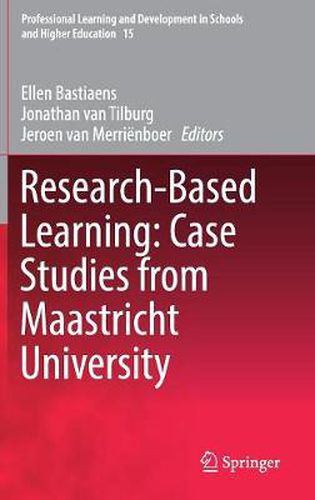Readings Newsletter
Become a Readings Member to make your shopping experience even easier.
Sign in or sign up for free!
You’re not far away from qualifying for FREE standard shipping within Australia
You’ve qualified for FREE standard shipping within Australia
The cart is loading…






This title is printed to order. This book may have been self-published. If so, we cannot guarantee the quality of the content. In the main most books will have gone through the editing process however some may not. We therefore suggest that you be aware of this before ordering this book. If in doubt check either the author or publisher’s details as we are unable to accept any returns unless they are faulty. Please contact us if you have any questions.
This book describes lessons learned from the implementation of research based learning at Maastricht University. Well-known for its problem based learning (PBL) educational model, Maastricht University implemented research-based learning (RBL) as a new educational concept in addition to PBL, around 2009. The model has taken the shape of an excellence programme offering third-year bachelor students an opportunity to conduct academic research together with academic staff. The introduction of the research-based learning concept into the programmes of all Maastricht University’s faculties has resulted in a range of RBL models that vary to fit the various disciplines and programmes offered by the faculties. The book first presents theoretical models and a description of the concepts of research-based learning and undergraduate research (UGR). Next, by means of case studies, it describes the formulas developed to suit the various programmes, the challenges encountered, the initial reservations on the part of the staff, the limitations caused by regulations and demands of the curricula, as well as the successes and results of the excellence programme. The disciplines described in the case studies include psychology and neuroscience, knowledge engineering, social and cultural sciences, law, and business and economics.
$9.00 standard shipping within Australia
FREE standard shipping within Australia for orders over $100.00
Express & International shipping calculated at checkout
This title is printed to order. This book may have been self-published. If so, we cannot guarantee the quality of the content. In the main most books will have gone through the editing process however some may not. We therefore suggest that you be aware of this before ordering this book. If in doubt check either the author or publisher’s details as we are unable to accept any returns unless they are faulty. Please contact us if you have any questions.
This book describes lessons learned from the implementation of research based learning at Maastricht University. Well-known for its problem based learning (PBL) educational model, Maastricht University implemented research-based learning (RBL) as a new educational concept in addition to PBL, around 2009. The model has taken the shape of an excellence programme offering third-year bachelor students an opportunity to conduct academic research together with academic staff. The introduction of the research-based learning concept into the programmes of all Maastricht University’s faculties has resulted in a range of RBL models that vary to fit the various disciplines and programmes offered by the faculties. The book first presents theoretical models and a description of the concepts of research-based learning and undergraduate research (UGR). Next, by means of case studies, it describes the formulas developed to suit the various programmes, the challenges encountered, the initial reservations on the part of the staff, the limitations caused by regulations and demands of the curricula, as well as the successes and results of the excellence programme. The disciplines described in the case studies include psychology and neuroscience, knowledge engineering, social and cultural sciences, law, and business and economics.